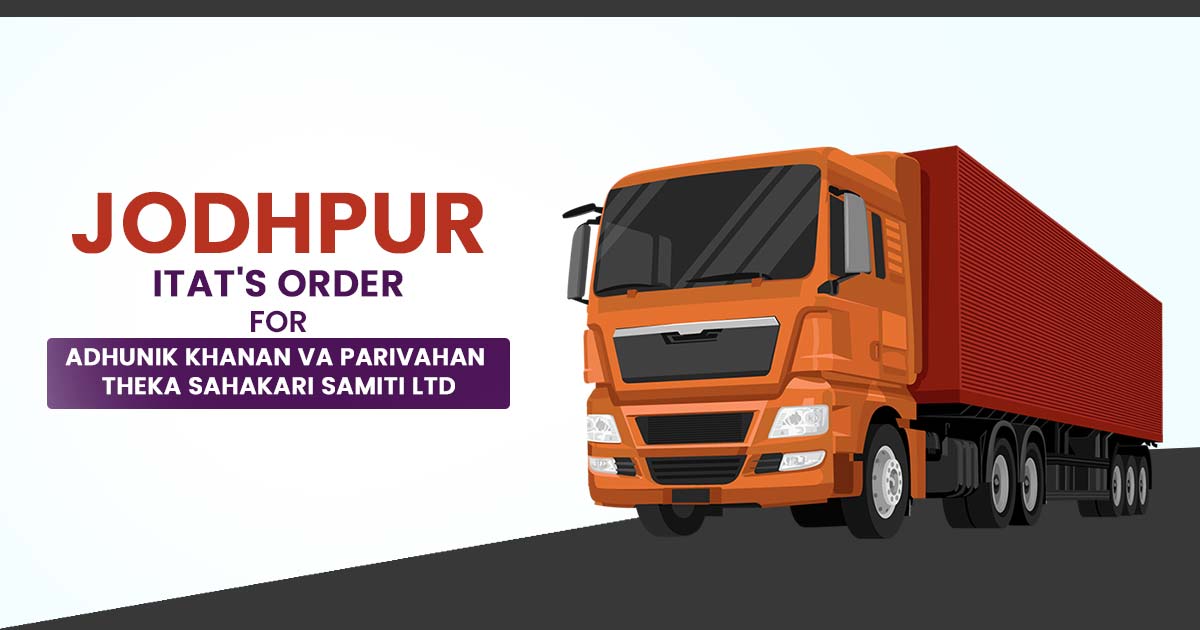
The Jodhpur Bench of Income Tax Appellate Tribunal (ITAT) ruled that the taxpayer, the legal owner, is not liable for TDS under Section 194C, where a declaration under Section 194C(6) accompanying a PAN is received via the payees who have the vehicle, but they are not registered owners.
The bench of S. Seethalakshmi (Judicial Member) and Rathod Kamlesh Jayantbhai (Accountant Member) saw that for Section 44AE of the Income Tax Act, the objective is the term owner suggests anyone in possession of the carriage of the goods and not the registered owner.
It mentions the importance of defining the term “owns” in Section 194C(6) as the taxation of the taxpayer transporter is squarely covered under the provisions of Section 44AE. The bench, when laying on the distinct precedents on the issue, and the Supreme Court opted for the question of ownership established on the purpose of the legislature, namely “to give benefit or to tax the assessee.
The petitioner deductor has the business of transportation and logistic services. A survey was executed at the taxpayer’s business premises deductor for verification of compliance with the provisions of Chapter XVII-B of the Income-tax Act, 1961. At the time of the survey proceedings, it was revealed that the deductor had made transportation payments to distinct individuals without deducting TDS based on declarations obtained from the vehicle owners.
It is seen that in certain cases the transportation charges paid to an individual other than the owner of the vehicle based on the power of attorney, Sahmati Patra, and TDS has not incurred the payments.
The AO mentioned that the declaration received via the taxpayer deductor could not be deemed a valid document under the provisions of Section 194C(6) of the Income Tax Act, 1961. Therefore the taxpayer has not fulfilled the basic condition stated under Section 194C(6). Hence, the taxpayer deductor is an assessee in default and obligated to file interest. CIT(A) affirmed the order.
The vehicle owners do not have a PAN, and the person who filed the declaration is not the vehicle owner, the department contended. The taxpayer is obligated to make TDS, and on account of such default, the demand has rightly been confirmed in the taxpayer’s matter.
The ITAT observed that transporters furnish the declaration including their permanent account number (PAN) to the payer to prevent TDS deduction. The Finance Act 2015 has authorized the revision to Section 194C(6) furnishing the deduction of tax at source till the transporter having the business of playing, hiring, or leasing goods carriages, owns not more than the goods carriages and provides the declaration to this effect including a PAN to the payer.
The revision is relevant as of June 1, 2015. The meaning of the word ‘owner’ occurs in Section 194C(6) for the deduction of tax at source. Should the term “owns” be taken to indicate registered owner under the Motor Vehicles (MV) Act, or should it be read to mean beneficial owner? The term owner has occurred in the Income Tax Act, of 1961, several times in many sections, furnishing a charge on the income or giving a provide advantage to the taxpayer.
The ITAT mentioned that as the declaration is received via the taxpayer and the purpose of Section 194C(6), the term ‘who owns” essentially directed that the one “who possesses,” and the taxpayer has paid to the person who filed the declaration.
| Case Title | Adhunik Khanan VA Parivahan Theka Sahakari Samiti Limited Vs. ITO |
| Citation | ITA Nos. 177 to 180/Jodh/2023 |
| Date | 12.02.2024 |
| Appellant by | Sh. Rajendra Jain, Adv. Smt. Raksha Birla, CA |
| Respondent by | Ms Nidhi Nair, Sr. DR |
| Jodhpur ITAT | Read Order |